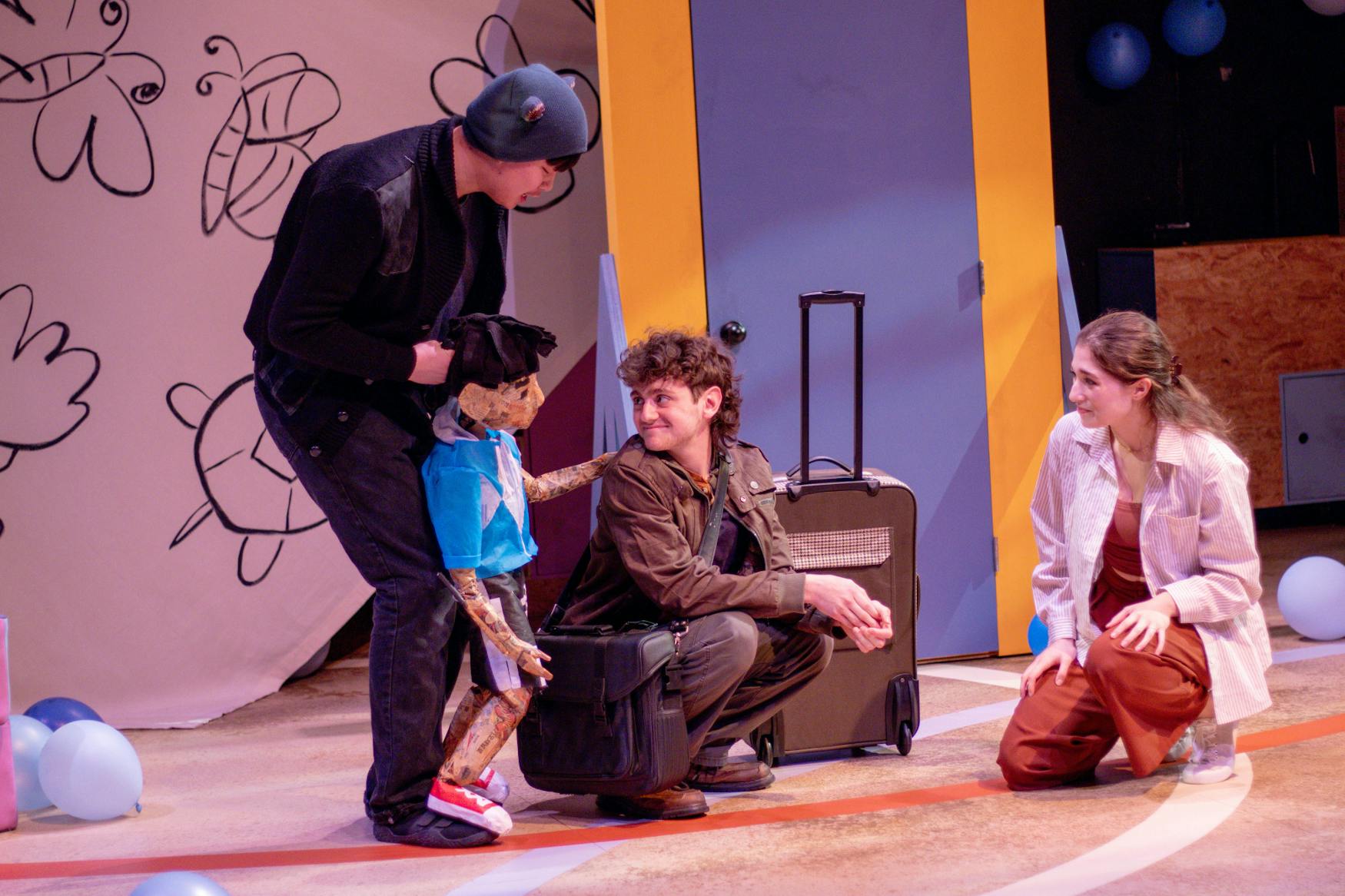‘Wolf Play’ thrills Brandeis audiences
The Department of Theater Arts show had four performances this past weekend, including a talk with the visiting writer.
“What if I said I am not what you think you see?”
The opening line of “Wolf Play,” written by Hansol Jung and directed by Sarah Shin, sets the mood for an emotional journey following the story of a young Korean boy adopted by a queer couple. Throughout the story, the audience witnesses the arc of the young child initially struggling to adapt to a new household, working through behavioral differences and finally finding a place within his new ‘pack.’
The Brandeis Department of Theater Arts’ spring production of “Wolf Play” delighted audiences with four different performances this past weekend from March 8-10. The five-person cast was incredibly talented and put on a moving performance on Friday night, Saturday afternoon, Saturday night and Sunday afternoon.
Playing with the imagination of the audience, the set and storyline emulated childlike, innocent ideas. Wolf-boy was this dual character played by Phoenix Yuan ’26 holding a puppet made out of various materials, including cardboard and plastic bags. The Wolf is the way the boy, Jeenu, expresses his personality. However, the Wolf is an alter-ego, as Yuan had lines on his own and then also lines holding the puppet. This duality allowed the audience to take in the actions of the actor and the actions of the puppet as separate at times but simultaneously the same being. The use of the well-crafted puppet and other ambiguous scenes gave the audience autonomy, inviting us into the conversation. The script also included informal and humorous dialogue such as knock-knock jokes and intimate moments between the lead of Wolf-boy and the audience.
The Saturday matinee had a special panel made up of Jung and Shin and was moderated by Kelly Mee Rich, associate professor of English at Harvard University. The talk, presented by the Department of Theater Arts and the Department of Asian American and Pacific Islander Studies was very insightful. The three discussed topics from incorporating Korean culture into the production to topics of family and togetherness. The adopted community also came up, and in response to how to best represent the narratives on stage, Shin commented that it came down to who her actors and actresses were. She got to know them personally and then put her twist on what she thought would be the best representation of the character. Jung noted that there were several avenues of writing the play that were not taken, and how intricate differences between different productions of “Wolf Play” highlighted different aspects of her writing.
“Easter eggs of Korean culture” were also worked into the play, and the malleability of it allowed the five-person cast to put their own spin and creative freedom on the writing. One attendee asked the director and writer how they reckoned with conveying a transracial adoption story and how they grappled with white guilt in the wake of it. Both Shin and Jung responded by stating that theater is an art where academics learn how to come to the audience, so when conveying a message, artists let the audience come to them. Dynamic scenes, fun sound effects and the use of a puppet kept audiences engaged. Scenes used the audience in “talkback” and jokes, a unique approach not often seen in formal theater.
Breaking the cycle of external expectations and traditions were other goals that Shin and Jung aimed for, along with emulating the essential values of theater. One of them held space for the fact that “the only thing that feeds love is imagination. Anything can feed hate.” The imaginative aspects of the play meant that each member of the audience took their own life lessons from the performance with them.
Liza Heck ’25, who brought the non-binary character Ash to life, commented on what the play meant to them, saying, “The process and production of ‘Wolf Play’ were entirely unique from any other theatrical production I’ve worked on — the experience of a world within which we explore topics including adoption, gender and found a family through the conduit of play and joy. Having such a tremendous amount of trust in the people within the space created a process that encouraged us to be authentic in ourselves and our characters such that the expression of truth was multidimensional. ‘Wolf Play’ taught me collaboration, empathy and love in its purest form.”
I attended the Friday night performance, the talk with the director and playwright and the Saturday night performance. Both times, the cast stunned me with their ability to convey larger-than-life meanings. Life lessons of creating your own family, queer and adopted family affirmations and a comical, emotional journey brought me and other viewers to tears. The comedic timing, set, acting and directing all combined to portray a really powerful story.
“Wolf Play” was an excellent selection for a department show, as it created the space for students to come into their characters as they wished and provided a storyline to affirm and bring to life the untold stories of the adopted, queer and Korean communities.
“What if I said I am not what you think you see?” was repeated in the last scene of the play. The repetition of this line made it stand out individually to the audience. The final line, “Does this change anything?” is reminiscent of the human aspect of theater and how profound storytelling can be.
The cast consisted of the Wolf played by Phoenix Yuan ’26, Ash played by Liza Heck ’25, Robin played by Rachel Shpuntoff ’26, Ryan played by Matthew Magee ’25 and Peter played by Sam Taxman ’27. Understudies included Helen Ma ’27, Arushi Choksi ’27 and Chris Li ’24.

Round of Applause: The cast of “Wolf Play” takes their final bows.



Please note All comments are eligible for publication in The Justice.